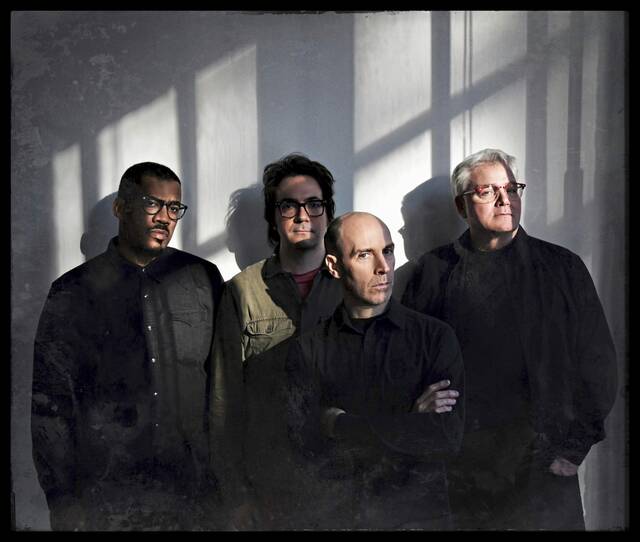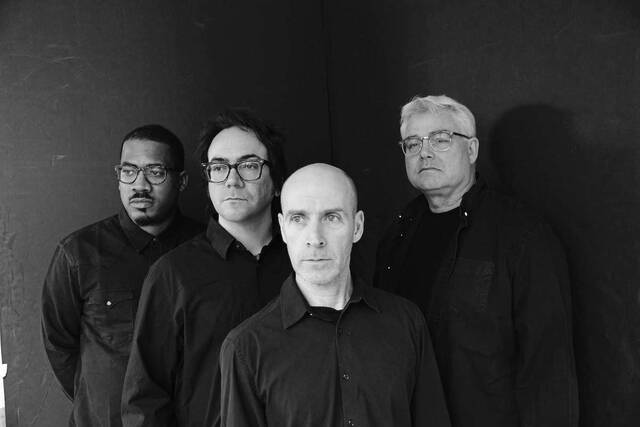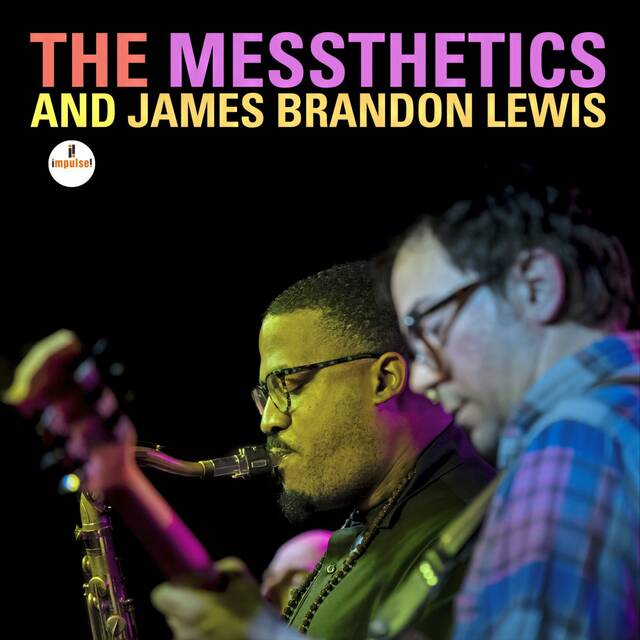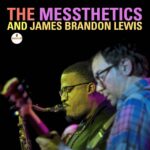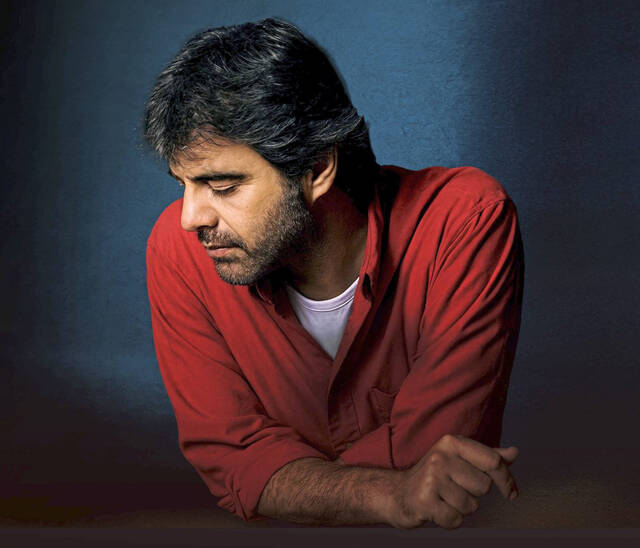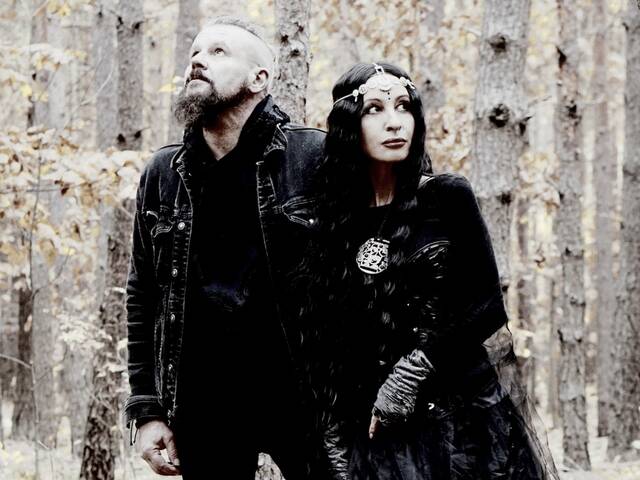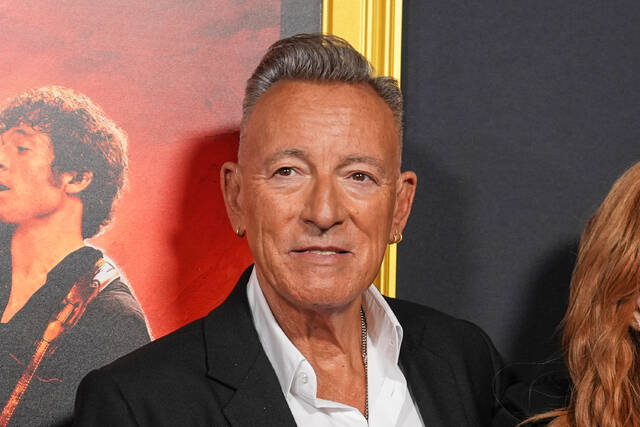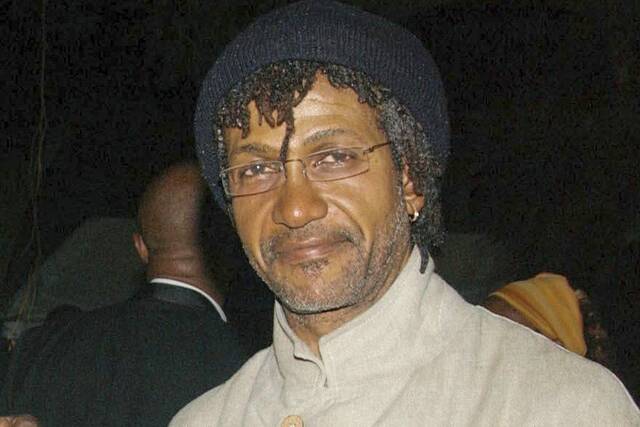Brendan Canty, the former drummer for hardcore pioneers Fugazi, jokingly surmised that having a record out before going on tour has proven beneficial for The Messthetics, his current jazz/punk band.
“Having people come to the shows that have actually heard the record is not something that I’ve always been good about doing. Fugazi, we would record a record, book (a tour) and leave like the day after the record was done to do a three-month tour and then get back and sit at home while the record came out,” he said with a laugh. “That’s a counterintuitive way to do things, so I’m always grateful if the record can come out first and then we can come out and present the live show on the back of that.”
The band’s third album, “The Messthetics and James Brandon Lewis,” came out on March 15 on Impulse! Records, and is the first full collaboration with the acclaimed New York saxophonist and composer, James Brandon Lewis. After a few weeks off, they’ll be opening the next leg of their tour on May 6 at Club Cafe in Pittsburgh.
Canty and Joe Lally, who played bass for Fugazi, first formed the instrumental trio with guitarist Anthony Pirog, with their self-titled debut album coming out in 2018 and “Anthropocosmic Nest” following in 2019. The band’s evolution continued with the addition of Lewis for this album.
Lewis, who had known Pirog for years, had joined the band on stage for a few songs at Winter JazzFest in 2019 in New York. Then The Messthetics appeared on Lewis’ “Fear Not” from his 2023 album, “Eye of I.”
“In a weird way, having two voices in the band is, I don’t want to say it’s the same as Fugazi, but it’s a similar thing where you have this dialogue going on,” Canty said. “We can be the rhythm section and then you have these two disparate voices kind of bouncing off each other all night, which is really great and they clearly — from my spectator’s point of view — are inspired by each other’s playing, so it’s been really lovely to have the shows elevated every night a little more.”
In a wide-ranging Zoom interview earlier this month, the four bandmates discussed their favorite songs from the album, the transition from a trio to a quartet, band dynamics and much more, with quite a few interruptions and laughs:
On the band’s dynamic changing by going from a trio to a quartet:
Pirog: There are just more textures available because I can join Brendan and Joe as part of the rhythm section now, and James can take the lead. We can trade melodic roles. We can combine them to create a different texture. Just being able to have another soloist to play off makes more activity possible so there could be a sense of more energy. I mean, the difference between a trio and quartet is just there’s more possibilities.
On meshing the band’s punk/jazz/experimental rock background into a cohesive project:
Canty: I think ultimately it was due to mutual respect really for everybody’s playing. Joe and I get along great and play together really well, and those guys get along great and play together really well … It was more like everybody just kind of taking a run at it. It’s like everybody kind of understanding where everybody’s coming from to a certain degree, but realizing that the sum is greater than the parts in a weird way. And everybody had the ability to bring themselves as themselves. Those guys weren’t like, oh, you have to change all your cymbals and play quietly and play jazz.
Lewis: “Jazz” (laughs)
Pirog: And get rid of your cymbals.
Lally: I was lucky I didn’t have to play upright bass.
Canty: Yeah, and put a hat on. (laughs) But there was no discussion along those lines. It’s like everybody shows up with everything that makes them themselves, right? We’ve all been playing music for so long. We all have our own toolkits and our own aesthetics and stuff. And we’re really lucky that they complement each other. As far as I’m concerned, they complement each other. I’m sure somebody (expletive) hates it.
Lally: You could say that the Messthetics, we figured out what the three of us like to do over those two records. Anthony had talked, I think after the second record was recorded, there was always talk from Anthony about having another voice involved and what that might allow into the picture. And I think all of us could envision music like that, the three of us. So him knowing James, I think that it just made clear who the candidate was. And then once we did that recording with him, I think it was like, this is not just a thing where we’re stepping in playing live. Now we’ve gone to the studio to do a song with him. Everything was just as comfortable as it was before, with him just getting up on stage, not knowing what was going to happen, but basically understanding he has this. This is not, he can do this, we just trust each other, and that’s a huge part of it. So it really did, after the “Fear Not” recording, it was just kind of like we knew we were writing with somebody else in mind to step in. And then it was very clear. And other ideas that I had started to open up in different ways that I could then say, this is going to be possible for the record. And everything we were writing just seemed to fall into place. We didn’t really get together with him until the day before we went in the studio.
Related
• Brooklyn's Bodega puts on art punk party in Pittsburgh concert• Pittsburgh's Eyewash continues evolution with heavy new single 'Bound'
• 2024 Pittsburgh area concert calendar
On the different process writing this album compared to the first two albums:
Lally: Absolutely. I think it actually opened up possibilities in the writing because they didn’t have to be so defined. We could actually just say this and this can happen and then James will do something different. (laughs) There’s an openness to the writing that way because you know if you’re setting things up, there’s two people who have a voice over it and so there’s a whole different way of writing. You don’t have to write it to death and sort of worry about it so much. It’s almost like you can write less.
Canty: Let’s leave space here for James to do his thing. Also, in advance of coming up to this thing, there’s whole spaces of underpinning of verses and choruses that didn’t have melody lines on. They were just like, this is a kind of cool part. (laughs) James will come up with something brilliant for the melody here, and he delivered, man.
Lewis: Talk about pressure.
Canty: Like it was Christmas.
On whether Lewis felt any pressure to fill those spots left for him:
Lewis: You know, I learn more and more every time we talk about these things. I’m like, wow, what’s this? No, it just felt natural, really. I just went in there, I’m a melodic person, I just naturally started hearing things, so that process was pretty organic.
On the solid relationships within the band:
Lewis: It’s been great. You’ve got to get along with the people you’re on the road with. Damn, it could go left really quick, plus I think we all have very similar, oddly enough, we all have very similar sense of humor. The sarcasm in this group is pretty thick, and we can all hang with the best of them. (laughs) There’s a lot of wit and sarcasm.
On life on the road:
Canty: We don’t listen to music on the road as far as I can tell. Nobody’s put on a damn thing this whole trip.
Lewis: I think we appreciated just talking to each other the whole time, which is probably strange. Yeah, we didn’t listen to any music.
Pirog: Not one song.
Canty: Not unless you count the sweet sound of the snoring.
Lewis: Do I snore?
Pirog: Oh, no, here we go.
Lally: You know, we had an interview where someone asked us about a playlist that we would play in the van and we seriously tried to think about that playlist, while we played no music. In the end, I guess we just were like, this is so obsolete.
Canty: You don’t snore, James.
Lewis: OK, cool.
Canty: Set the record straight, while the press is in the room.
On the possibility of this album being a gateway to jazz for punk fans and to punk for jazz fans:
Lewis: Yeah, I feel that way, for the little kid. For the adults, they should know, they should understand something. I mean, I always think about the fact that I, too, was a curious little kid. Some of the people I used to listen to when I was a kid, when I started to dig more into who they were, find out their influences and who they liked. So I think there will be some curious people out there who will look at the record and be like, who is Brendan Canty? Who is Joe? As a matter of fact, it’s been a gateway already, like, I’ve had my own family members look these folks up. They’re like, wow, Fugazi was a thing, you know? So it’s already happened.
On fans being respectful and not yelling out for Fugazi songs:
Canty: The Fugazi fans who show up to these shows, which seems to be a lot, they seem to like the record and they seem to like the band for all probably the same reasons because it’s the way we play together. We’re coming at this thing from a really honest place, right? We’re not like oh, yeah, we’re gonna be Fugazi or we’re gonna be this or that. There’s not a premeditation. We’re literally bringing ourselves in 2024 to the project as we are now. I mean, that’s kind of a crucial thing. … We’re not trying to bring anything back, but we’re trying to respond to each other honestly as musicians and play.
Joe: It’s not a recreation of something that happened, a rehashing of some old thing. We’re literally trying to figure out what we are and what we can do.
On their next album, after “The Messthetics and James Brandon Lewis” was recorded over a weekend:
Canty: We’re going to take three days. (laughs)
Lewis: Four days.
Canty: There was a lot of writing involved and despite what Joe says there was trading back and forth of like charts, and James sent us down some stuff in advance so there’s a lot of writing that goes into the process. But, you know, Messthetics get together twice a week and do sessions to write. We’re writing all the time, and everybody’s at home writing all the time. The music doesn’t stop, so we’re always working.
Favorite songs
Each bandmate weighed in on the track from the new album that best exemplifies The Messthetics, and even that spurred interjections.
Canty: I like the first song, “L’Orso,” because it’s a really distinct melody that Anthony had that was really just elevated by the saxophone, and it was like this kind of angular — I don’t know how you’d even call it, I don’t even know what kind of music that is — but it was like once the combination of Anthony and James started playing that melody, it just felt like an entirely different song. That, I thought, was a really beautiful elevation of something we’d already written, where James made it like a whole different animal? And then the soloing on that is just wickedly, like, percussive and beautiful for both of these guys.
Pirog: I like “Boatly” because of the dynamic range we cover from the BMPs to the end. I also like how everyone contributed to the composition. Joe wrote the bass line for the first part. I wrote the melody, I wrote the chords for the B section. Brendan wrote the melody by singing over it. And then James just took the end to new heights. So that, for me, is the track on this record that kind of sums up everything that we’re working towards.
Lally: “Boatly,” that’s the way I like to write. I like to write what I think is a verse that really leaves the opportunity for people to be able to get melodies on top of that. That’s a good example of what I’m thinking about if I’m sitting around trying to write a bass line, so that’s a great track for that. The song “Three Sisters” probably does the same kind of thing where everybody’s contributing something.
Pirog: I will add because that came up, that melody (hums), I was thinking about James before he was even part of the conversation when we were putting that song together. That melody reminded me of something he would hum or play.
Lewis: That’s so sweet.
Pirog: I just want to always get that in. (laughs)
Lewis: I would have to pick “Three Sisters,” “Boatly” and “Fourth Wall” as my three that really say what the album’s about. Then on top of that, I think me and Anthony share a similar melodic approach just over the years, 10 years. Sometimes I listen to his stuff, and I’m just like, man I could have wrote that. He’s like the only person I’ve ever felt that way about from a music standpoint. I’m just like, this cat is in my head. What’s going on? (laughs) So that’s the thing that we vibe over.


